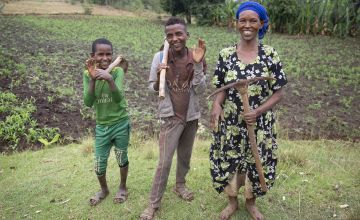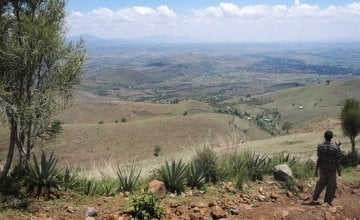
Read our 2023 annual report

Knowledge Hub
REGRADE Ethiopia
From 2017–2021, Concern Worldwide implemented an Irish Aid funded Graduation Programme entitled REGRADE: REsilience / GRADuation / Evidence with the goal to ‘build livelihood security and improve nutritional outcomes among the extremely poor households living in South Wollo, Amhara and Wolaita Zones, SNNPR Ethiopia’.

Graduation programmes provide an integrated and sequenced package of support to create pathways out of extreme poverty. The approach helps programme participants meet their basic needs whilst allowing them the opportunity to invest in themselves and expand new or existing livelihood activities.
In addition to building household assets, the REGRADE Programme aimed to address the root cause of poverty in a given context and so it followed a Participatory Community-Based Watershed Management Approach in order to build the resilience of participating households and the wider community.
Watershed Management is the process of managing human activities and natural resources within a watershed, taking into account social, economic, environment and community interests.

The key takeaways from the final evaluation were as follows:
- The programme was relevant and majorly achieved the planned outcomes and impact.
- The design is scalable to many other locations and countries.
- The planning process, targeting and activity selection was participatory, rigorous and transparent.
- The watershed approach was effective.
- The Graduation model used demonstrated the ability of targeted beneficiaries to graduate to a food secure status.
- To ensure sustainability, government is encouraged to maintain the momentum as it takes over responsibility of the programme.
Download Resources
This page describes a programme funded by Irish Aid. The ideas, opinions and comments therein are entirely the responsibility of its author(s) and do not necessarily represent or reflect Irish Aid policy.




